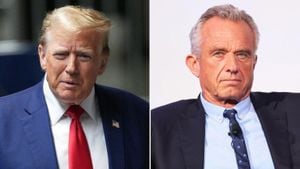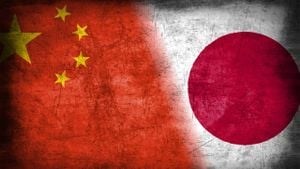The International Criminal Court (ICC) has recently made headlines by issuing arrest warrants for Israeli Prime Minister Benjamin Netanyahu and former Defense Minister Yoav Gallant, spurring varied reactions around the globe. The charges against them come amid intense scrutiny of Israel's military actions during its current conflict with Hamas, particularly following the escalation of hostilities post-October 7, 2023.
Shortly after the ICC's announcement, the White House asserted its unwavering rejection of the court's authority over the Israeli officials. "The United States fundamentally rejects the Court’s decision to issue arrest warrants for senior Israeli officials," stated a spokesperson for the National Security Council. They expressed concern over what they termed the prosecutor's 'rush' to seek these warrants, citing 'troubling process errors' leading to the court's decision.
President Biden was equally vocal, emphasizing, "Let me be clear once again: whatever the ICC might imply, there is no equivalence — none — between Israel and Hamas. We will always stand with Israel against threats to its security." This declaration aligns with the administration's established position, which has been skeptical of the ICC's jurisdiction over allied nations, especially those not ratified under the Rome Statute.
Simultaneously, the international community is observing the ramifications of this unprecedented move by the ICC. The warrants signal the court's attempts to hold leaders accountable for potential war crimes, as detailed accusations against Netanyahu and Gallant include war crimes and crimes against humanity, primarily linked to military actions against Palestinians during the conflict.
Countries like the Netherlands have stated they would comply with the ICC’s warrants, with Foreign Minister Caspar Veldkamp affirming they would arrest either official if they entered Dutch territory. On the other hand, responses from nations such as France and Ireland have been more cautious; officials there acknowledge the ICC's authority but are wrestling with the legal intricacies involved.
Reports indicate tensions running high, particularly among European states. The EU's foreign policy chief, Josep Borrell, stated the ruling applies to all EU member countries, emphasizing the necessity for compliance with international law. Meanwhile, reactions from within the region are painting varied pictures of potential judicial dynamics.
Hamas, the Palestinian militant organization, welcomed the ICC’s decision, asserting its calls for accountability among all leaders of criminal occupation, positioning this action as part of their broader struggle against perceived aggressors. Their statement reflects the broader sentiment among Palestinian solidarity groups who view international legal mechanisms as pathways to justice.
While the situation evolves, condemnation from Israeli leaders is expected to intensify. Netanyahu and Gallant, already under international scrutiny, argue their actions align with Israel’s right to defend itself against rocket attacks launched from Gaza. They’re pushing back on what they deem unjust accusations aimed at undermining Israel’s sovereignty and national security.
The U.S. response has been steeped not just in diplomacy but also political ramifications. Incoming Republican officials are vowing to take punitive steps against the ICC, with Senate Majority Leader John Thune asserting, "The ICC’s arrest warrant against Prime Minister Netanyahu and former Defense Minister Gallant is outrageous, unlawful, and dangerous." Such sentiments indicate potential clashes between the U.S. Congress and international bodies like the ICC as the political tides shift come January.
Analysts highlight the ICC’s wedding of legal and political ramifications forms a convo-style battlefield, where charges communicate more than legal proceedings—they reverberate through international political landscapes. Engaging with this case, legal experts and diplomats are closely watching the interactions, especially concerning whether the ICC’s actions might deter or embolden future military responses from Israel.
Beyond the political statements, the staggering toll of the conflict hooks the discussions. Since the onset of hostilities, have caused significant civilian casualties, inflaming emotions both within Israel and the Palestinian territories. International organizations are redoubling calls for ceasefire and addressing humanitarian concerns, as death tolls soar, primarily affecting non-combatants.
The narratives intertwining local and global politics can lead to unpredictable outcomes, already evidenced by protests erupting globally from various factions underlining stances on both sides of the conflict. The socio-political dimension surrounding the ICC’s decision feels pivotal, shaping dialogues about justice, accountability, and the use of force.
Simultaneously, there are voices from various quarters urging caution. Domestic and international advocacy groups are creating platforms to argue against aggressive political rhetoric advocating for unyielding stances on military actions. They urge open dialogues instead, emphasizing the need for peaceful resolutions over militaristic responses.
International law advocates see the ICC’s warrants as significant but just one cog within the broader wheel of justice and accountability concerning war crimes and humanitarian rights. They argue this only matters when paired with solid international partnerships.
That said, the ICC’s decisions lead to pressing questions about its effectiveness and influence on international law. Tensions will undoubtably escalate as discussions around the validity of courts and the necessity for justice clash with national interests and political narratives. The balance between national defense and human rights, as illuminated by this ICC action, underlines the challenging nature of today's geopolitical climate.
Overall, as the world waits with bated breath on how both the U.S. and European allies will maneuver through these tumultuous waters over the coming weeks, it's clear the ramifications will extend well beyond immediate legal outcomes. With conflicting narratives and intense politicking surrounding questions of war crimes and international accountability heating up, the future of international relations hangs delicately for all parties involved.



